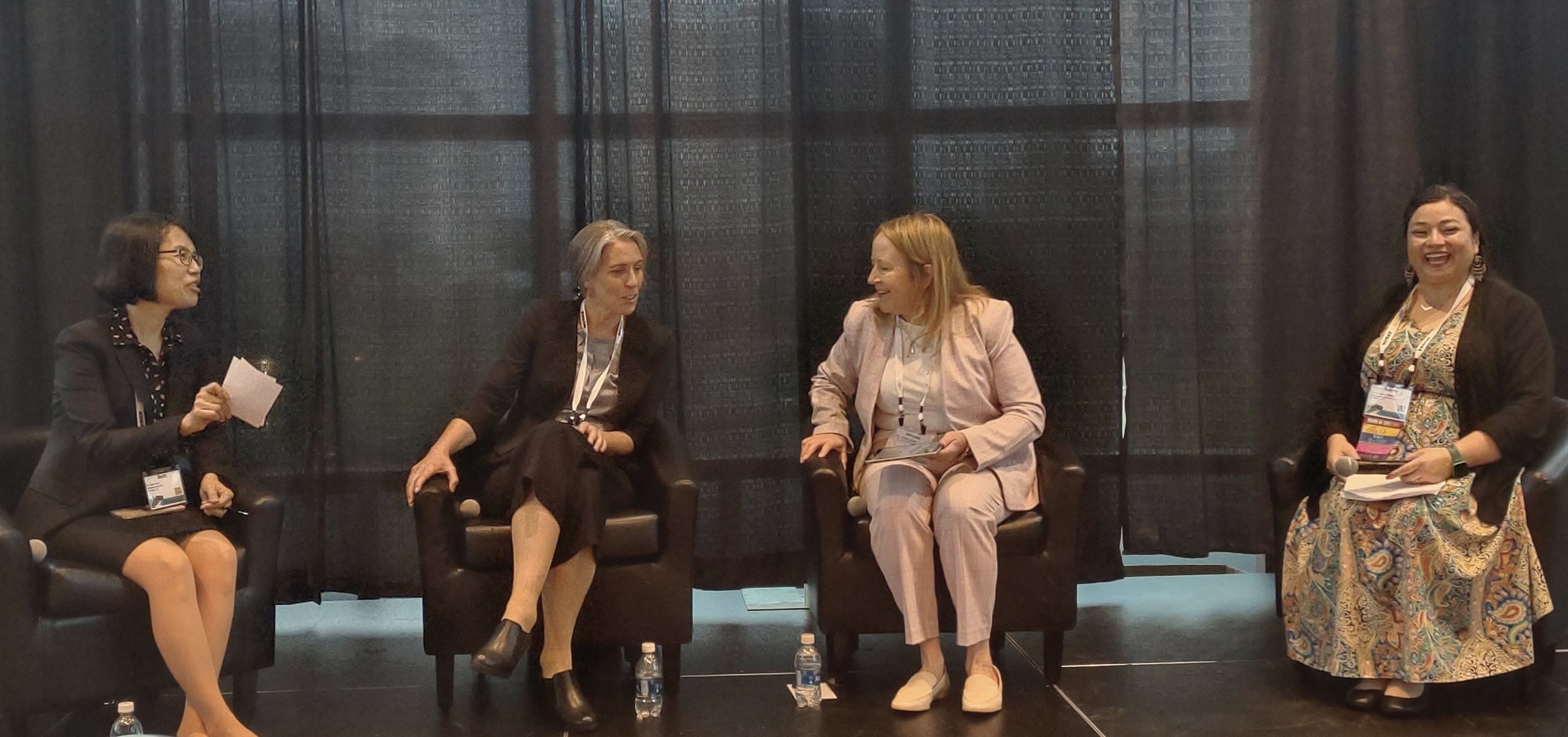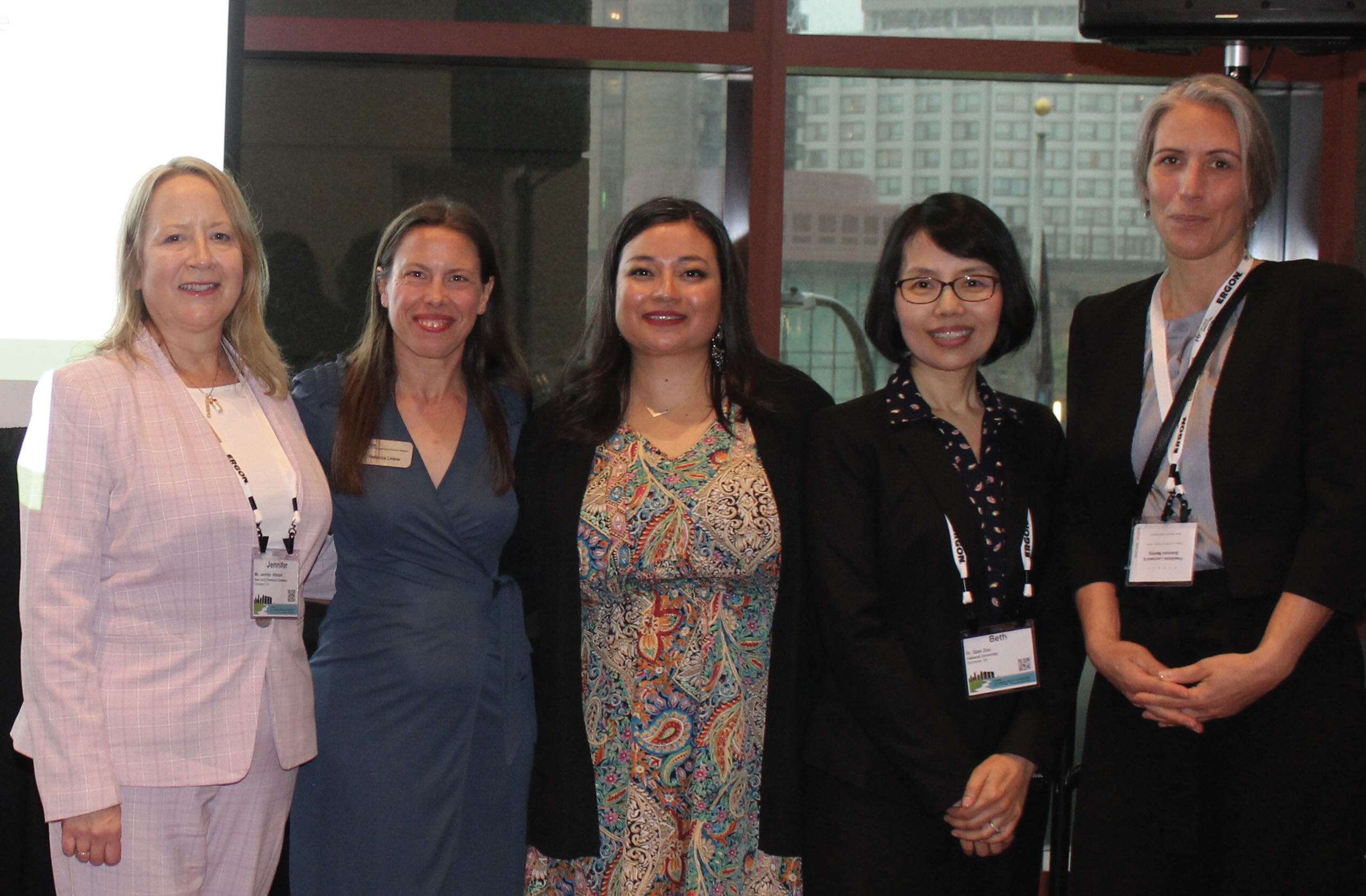
The Women in Tribology Panel during the 2024 STLE Annual Meeting & Exhibition.
TLT: How would you suggest we get more involved in the field for those in school and those just starting out in their careers?
Bäse: It’s now a bit difficult for me to estimate the situation in North America, but referring to Germany or Austria, I think tribology is already involved in schools, in vocational training and partly in universities. One problem is that learning content is often not called “tribology.” For example, in physics lectures, everyone remembers the blocks on the inclined plane, or in vocational training as car mechanics, you learn a lot about oils and wearing parts. In universities you are calculating gear or bearing lifetime with equations developed based on tribology knowledge. A lot of people are working on tribology issues without even knowing that this is tribology. Therefore, I think a key is to make tribology more publicly known, which also would help with other issues that tribologists constantly have (e.g., explaining tribology to get government funding or tribological measures in to implement companies or to gain new members in societies related to tribology). This topic also is one of my personal concerns, and that is why I am very actively involved in making tribology more public, increasing the level of awareness of tribology, explaining what tribology is and what tribologists do and the advantages that implementing tribological measures bring. Ultimately, tribology is omnipresent and will be a key to social issues in the future—for example, when it comes to measures to reduce CO
2, increase sustainability and the associated cost reductions through reduced energy consumption.
TLT: Have you seen any changes in the way women are regarded in tribology, and is there any room you see for improvement?
Altstadt: Reflecting on my mother’s experience, she was the first woman allowed to work in a secretarial role at Bethlehem Steel after marriage. In contrast, I haven’t faced formal barriers to employment, and I’ve seen workplace policies evolve to support women and those needing personal flexibility. These changes include flexible working hours, job-sharing roles, part-time options and parental leave for birth or adoption.
In technical roles, I’ve observed a remarkable transformation. I went from being the only woman in workplace meetings to seeing women hold key roles such as technical director, key account sales and executive positions and watched others seek technical expertise from others regardless of gender or race. The diverse cohorts in my engineering and executive MBA programs have demonstrated that varied perspectives are invaluable for problem solving and driving business success. I am hopeful others recognize this when making staffing decisions.
Despite the progress, there is still room for improvement, particularly in supporting individuals with personal demands like childcare and elder care. Enhancing support in these areas can help ensure that all employees, including women, can thrive both professionally and personally.
TLT: What is your advice for young women starting their careers in STEM or tribology?
Zou: I do have a lot of advice that I would like to share with young women who are just starting their careers. The following are the most important ones based on my experience. First, build a strong professional network. This can be done by attending conferences, workshops and networking events. Connecting with peers can open up opportunities for collaboration, mentorship and career advancement. Second, find trustable mentors. Mentors can provide guidance, support and advice as you navigate your career path. When you are facing challenges and difficult situations, they are good resources to offer valuable insights and suggestions. They also can be strong references when you go for promotions or pursue other opportunities. In addition, take care of your physical and mental well-being. Keep it in mind that work is not the only part of your life. As a woman, you have a lot of roles to serve. Keeping a healthy work-life balance is very important. Don’t hesitate to seek support when needed. The support can be from various resources including your employer, colleagues, friends and family members. Last but not least, be resilient. Life always has its ups and downs, but don’t let setbacks discourage you. Failures and setbacks are temporary. Believe in yourself, that you can overcome them with determination and support.
 From left to right: Jennifer Altstadt, STLE executive director Rebecca Lintow, panel moderator Elaine Hepley, Qian(Beth) Zou and Mirjam Bäse.
From left to right: Jennifer Altstadt, STLE executive director Rebecca Lintow, panel moderator Elaine Hepley, Qian(Beth) Zou and Mirjam Bäse.
TLT: Did you ever consider leaving the field of tribology? What made you stay?
Bäse: That’s very easy to conclude: no! I think once you slip into this field, it’s difficult to slip back out due to the low friction! But joking aside, I think one reason that made me stay in this field is that I am a person who always needs, on the one hand, the opportunity of selfdevelopment on challenging topics and, on the other hand, I need the feeling that I do something different compared to the average of society and that I’m doing something new. This all is given by working in tribology. I do not have to explain about the challenges we are facing in this field. And there are so many things to discover for my self-development, be it in professional development, networking, communication, managing or connecting different people to each other for solving a problem. And I always liked the stories of scientists in the past who were finding out things that were important for our society. This happened in the past more often, because there were a lot of basics in natural sciences to be found out during the time more than 200 years ago. Today it is much more difficult to find out something special, but tribology offers a way to do something special and uncommon and can contribute to our society in many ways.
TLT: Did you have, in your career, the feeling that you need to overperform to feel accepted or felt another way to not get respected by the community?
Altstadt: While I have always maintained a personal drive for excellence, external perceptions added to the pressure. There have been times when being the only woman in the room made me feel obligated to speak up to provide a different perspective that wasn’t being represented, even if I felt like I was taking a risk. I vividly recall a significant moment early in my career in another industry. During a staff meeting, there was a discussion about offering part-time roles. The prevailing sentiment was that choosing part-time work signaled a lack of commitment and rendered individuals non-promotable. As the only woman in the meeting, I distinctly remember speaking up against this viewpoint, advocating that we could not offer a benefit and then penalize those who opted for this benefit. This discussion underscored my need to lean into discussions and continually overperform to prove myself.
At Sea-Land, we prioritize fostering a culture of belonging where everyone can thrive. It’s encouraging that our business partners increasingly emphasize inclusivity and transparency as foundational to our collaborations.
TLT: Did you have any female role models? If so, what influences did they have on you?
Zou: My mother is a great role model for me. She has shaped my character in
many ways.
When I was young, my parents lived separately. My mother, who was an elementary school teacher at the time, took the responsibilities of caring for my younger brother, me and our elderly grandfather—in addition to her demanding workload. Although I was young, watching her manage demanding workloads, household responsibilities, financial obligations and political pressures taught me what it means to have endurance and be resilient.
When I went to middle school, my mother decided to leave her teaching career, where she was loved by her students, and took on a clerical role in the institution where my father worked in order to reunite our family and ensure better educational environments and opportunities for my brother and me. Seeing her prioritize our family’s well-being ahead of her career deeply touched me and emphasized her willingness to sacrifice.
Although my mother is not a direct role model for my career, her showing characteristics like hardworking, resilience and sacrifice have definitely affected my understanding of character and shaped my perception of what it means to be a strong and compassionate person. These great qualities have been crucial to my career success.
TLT: How do your morals influence your work life? Have you faced any moral dilemmas?
Bäse: One core value to me is being authentic, and to me, being authentic means, for example, being honest, open minded and reliable. A second core value for me is idealism. This means, to me, a piece of perfectionism (with a healthy proportion between effort and benefit), optimism and enthusiasm (with a portion of realism) as well as moral striving. Idealism helps me hold on to my values, and I always have the aim to act according to them. Values do have a big influence on my daily work but also in my private life, and from my point of view, values are a key for a functioning society.
Regarding this second question, I remember a quote from a movie, but I unfortunately do not remember the title. The movie was about a businessman who built up his business in an environment where normally only mafia bosses were in charge. But this businessman didn’t follow the mafia rules and built up an honest business without crime and was at the end very successful. At the end of the movie he was asked how he was successful without being a criminal, and the given answer burned in my head—and is at the end so true and applicable to so many situations: “I always went the most honest way.” So that means, of course, you can’t be honest at any time. Sometimes you must prioritize your own values, for example, to protect others. I hope that answers this question.
TLT: What are the promising career prospectives for the women who are taking courses in tribology?
Altstadt: The technical field, particularly tribology, fascinates me due to its complexity and problem-solving nature. Throughout my career, I have prioritized engaging in challenging technical fields, and tribology has been a perfect fit. It plays a crucial role in the design and functionality of a wide range of applications.
Tribology’s significance extends beyond technical applications to sustainability, which is an area that is getting more attention. It is essential for enhancing efficiency and conserving energy, aligning with global discussions to drive sustainable practices. Tribology offers diverse opportunities, from addressing specific application issues, researching emerging technologies to optimizing processes or transitioning into commercial roles like strategic marketing or account management.
I believe people seek fulfilling and secure careers, and tribology offers incredible opportunities. Despite healthy competition, our industry fosters a supportive community where professionals care about each other’s growth and learning. I have had the opportunity to be in a couple of other industries, and I have not seen an organization like STLE that provides an incredible platform for learning. Companies and organizations like STLE must offer avenues for learning and networking. Equally important is for young women to seize volunteer opportunities with STLE local sections. These opportunities provide a safe environment to explore leadership roles and discover career opportunities within tribology.
You can reach Jennifer Altstadt at jennifer.altstadt@sealandchem.com.
You can reach Mirjam Bäse at mirjam.baese@magna.com.
You can reach Qian(Beth) Zou at qzou@oakland.edu.